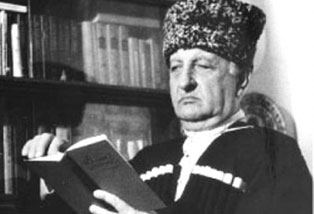First online version in Georgian language
Aleko Tskitishvili
The Human Rights Center intends to publish the novel of Abkhaz writer Bagrat Shinkuba “The Last of the Ubykh” in Georgian and Abkhaz languages in the framework of the “Sorry” Campaign. Initially, the Center intends to prepare and upload bilingual versions of the novel on its websites www.humanrights.ge and www.apsni.org
The online version of “The Last of the Ubykh” has been already uploaded on the www.humanrights.ge. You can also read an interview with the translator of the novel Tamar Chijavadze on the same website. She spoke about the novel, personal traits of the writer and his friendship with Georgian writers.
Bagrat Shinkuba represented the Abkhaz classic literature. His poetry and prose describes historical and modern aspirations of Abkhaz nation. His novel – epopee “The Last of the Ubykh” was particularly popular which describes the tragedy of Abkhazian people and their kindred Caucasian nations –so called Muhajir exile in the mid XIX century.
Although, there are many works of historians about Muhajir exile, the event has not been properly evaluated yet.
Throughout the XIX century the Russian Empire invaded the Caucasus region. Various nations opposed the policy of the Russian empire policy. Among them were Abkhaz, Abazgs, Ubykh and other small nations. Bloody battles occurred near the territory of nowadays Sochi where the rebel of Caucasian nations was subdued in blood; as a result, Russians called the place “Krasnaya Polyana” – Red Valley.
Muhajir exile –was continuation of the invasion policy of the Russian Empire. According to the modern international law, it was both ethnic cleansing and genocide. The defeated Caucasian nations had two choices – to resettle to Kuban –remote Russian region or to Turkey where Sultan promised them to give shelter.
Bagrat Shinkuba’s novel “The Last of the Ubykh” describes forced exile of the Ubykh people – kindred nation of Abkhaz people – to Turkey. In parallel to it, it describes the exile of Abkhaz people too. The main character of the novel is 100-year-old Ubykh Zaurkan Zolak; 70-80 years later Abkhaz ethnographer found him in Turkey during his business-trip in 1930s. The plot of the novel is developed based on the ethnographer’s story. When evaluating the novel, critics said the background of Zaurkan Zolak, his “bloody story follows the tragedy of Ubykh people like a wound.”
In 2005, Bagrat Shikunba died at the age of 88. He was buried in Sokhumi. Before the Georgian-Abkhaz conflict, he had close relationship with Georgian writers; Grigol Abashidze, Nika Agiashvili, Rezo Margiani, Shota Nishnianidze translated his rhymes into Georgian. “The Last of the Ubykh” was translated by Tamar Chijavadze, wife of Shota Nishnianidze and publishing house Merani published the novel twice in 1980s. Bagrat Shikunba also actively translated novels and rhymes of Georgian writers into Abkhaz language.
Although 50 000 copies of “The Last of the Ubykh” were published about 25-30 years ago, today it is bibliographic rarity and Georgian readers have small information about it. There is only Russian online version of the novel. People could read its Abkhaz and Georgian versions only in printed form.
The Human Rights Center acknowledges the fact that Muhajir exile was tragedy not only for Abkhaz but for Georgian people too, because several hundred Georgians were also exiled to Turkey. Simultaneously, those Georgians, who lived in historical Georgian villages, invaded by the Ottoman Empire, met them in Turkey. One of the main characters of The Last of the Ubykh is Georgian blacksmith Daut (David) – a friend of Zaurkan Zolak.
The Human Rights Center intends to publish Georgian and Abkhaz versions of The Last of the Ubykh in the framework of the “Sorry” Campaign. Initially, the Center plans to prepare bilingual online versions of the novel which will be uploaded in PDF format on the four-lingual website of the “Sorry” Campaign www.apsni.org. Afterwards, the novel will be published in Abkhaz and Georgian languages in one folder.
The Human Rights Center’s initiative is to add Bagrat Shinkuba’s The Last of the Ubykh and his best rhymes to the education program of the Georgian public schools. The Center calls upon the corresponding departments of the Tbilisi City Hall to give the name of the famous Abkhaz writer to one of the streets in Tbilisi where the statues to the writer and his famous character – the Last of Ubykh might be set up as well.




